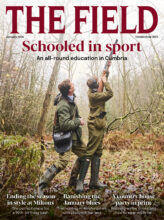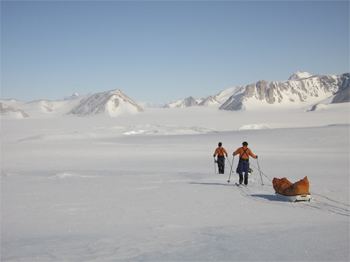At the end of January last year, three Britons recorded the longest unassisted journey in history to the geographic south pole, pulling their sledges more than 900 miles in temperatures of -55C and below. They reached 90 degrees S/0 degrees W almost exactly a century after Ernest Shackleton’s Nimrod expedition was forced to turn back slightly less than 100 miles from the prize. Each member of the Centenary expedition was a descendent of a member of Shackleton’s original team. “The trip was about completing unfinished family business,” explains Will Gow, the 34-year-old great-nephew of Shackleton. The skeleton map of the route on the bar table, depicting the traverse of the Ross Ice Shelf to the Beardmore Glacier and across the polar plateau to the pole itself, did little to convey the extent of their accomplishment.
Will was quick to play down comparisons between his own trip and Shackleton’s, even though fewer than a dozen humans have followed the route. Indeed, more men have stood on the surface of the moon than have crossed the Beardmore Glacier. “With the same technology and knowledge, the Nimrod team would have made it to the pole,” says Will. “We had bespoke clothing made by Timberland, GPS to keep on the right path – we also took the same compass Shackleton used, which still worked perfectly – and we had iPods to fight the boredom. But the biggest difference was our food; my great-uncle effectively failed because his team ran out of it.” Instead of pony meat and hard biscuits, the modern trio could rely on a daily intake of 6,000 calories from chocolate, freeze-dried ready meals and energy drinks. “We each carried 140kg of provisions, which was a large part of our total weight, including 15kg of salami for its fat and protein,” says Will. “Mealtimes are vital for keeping morale high.”
Sports psychologists talk about positive mental attitude, which is an easy concept to forget when you have missed four crossing pheasants in a row. But out in the Antarctic, this can be a life-saver. “If you have negative thoughts you will fail,” says Will. “Sensory deprivation is a challenge. Every day, especially when crossing the Ross Ice Shelf, we had hours when all we could see was ice. Your perspective on life becomes so simple: one step after another. Ski for 10 hours, set up the tent, eat, sleep, then do it again. I found it immensely rewarding. Gone were all the stresses of modern life.” He owes a large part of this spirit of outdoor adventure to his upbringing as a country sportsman.
As a boy, he would read stories about his distinguished ancestor, dreaming of following in his footsteps. Deerstalking in the Highlands stirred his imagination for wild, open places. Like so many City boys with a sporting background, his mind would wander from the concrete, noise and stress of London to the gentler places where blackberries fill pies and not airwaves. Will is a member of a walk-one-drive-one pheasant-shooting syndicate on the North Downs. I was upset to miss the shooting season last year with the expedition,” he admits. “But I was able to fantasise about having the perfect day, when you never miss and shoot all the best birds. I suspect that I’ll be rusty as a farm gate next season and miss the lot!”
LACK OF UNDERSTANDING
Typical of men who achieve great feats of endurance or bravery, Will talks about his experiences in a matter-of-fact manner. “Difficulties are just things to overcome, after all,” said Shackleton in 1909, and it appears that his modesty gene is a dominant one. This self-effacing stance differs greatly from the sensationalist BBC series On Thin Ice, which documented the recent race to the south pole by TV presenter Ben Fogle and Olympic rower James Cracknell. Was there any sympathy for these celebrities’ struggles in Antarctica? If Will had hackles under his suit, they definitely rose. “It was embarrassing, wasn’t it?” he snorts. “They were ill-prepared, over-ambitious and showed a lack of understanding of their surroundings. Skiing for 16 hours a day was crazy with so little experience and no recovery time. We never did more than 10 hours. And their personal administration was so naive. Contracting pneumonia because you have not acclimatised is a schoolboy error. They didn’t respect the environment they were in and suffered as a result.”
But I had my suspicions that Will’s own journey, that measured the length of France in temperatures that fell as low as -65C, was not the cakewalk that he was describing.
Indeed, once the trio reached the far end of the Ross Ice Shelf, they began the gruelling ascent of the Beardmore Glacier and on to the crevasse fields, which had claimed the life of the last of Shackleton’s four ponies.”At times it was terrifying. We were roped together for safety, but a slip from one of us could have dragged the rest under. For three years previously, we had taken regular trips to the Arctic to acclimatise and learn to spot crevasses, but when you are there on your own, with no chance of recovery, it becomes very real,” he says. “Every night we thanked our lucky stars we were still alive,” he recalls. “One of the scariest days was Christmas Day itself, when we set up camp in the middle of a crevasse field because we were too exhausted to carry on. We could hear the ice cracking around the tent. But just as Shackleton’s team did 100 years before us, we celebrated Christmas with a glass of crème de menthe and a cigar.”
DEATH OR GLORY
Another tradition the descendants revived was the Antarctic Malt Whisky Appreciation Society, which would convene in the tent on a Thursday evening. Fortunately, we share the same taste in whisky, namely the Islay malts, so we had a weekly tot of Laphroaig or Caol Ila to warm us.” Once through the crevasses, these pilgrims progressed up on to the polar plateau, which marks the final dash to the pole. Antarctica is the highest continent with an average altitude of 7,500ft above sea level. The polar plateau itself rises to 10,000ft. This height proved to be the greatest trial to Will, as he suffered constant nausea for the rest of the journey. Shackleton by this stage was contemplating death or glory. With rations dwindling, he could have forged on to claim the pole, but his team would have perished as 0 party would do three years later. Barely 100 miles away, the closest that man had come to the south pole, “The Boss” decided to turn round to save his men.” At exactly the same point, 88 degrees 23 minutes, the three descendants recreated the iconic photograph taken 100 years previously. “That was perhaps the most emotional moment,” says Will. “I can’t imagine what it must have felt like to get so close and then walk away. The easy decision would have been to carry on, sacrificing his men’s lives.” But Will and his team did continue, reaching the American-run Amundsen-Scott research station 66 days after they had set off, completing their families’ pledges to conquer the south pole. “It was a huge relief to arrive, but surreal at the same time. The research station is just a mess of hangars and fuel tanks. One minute we were struggling with our sledges in extreme wilderness and the next we were in a heated cafeteria, drinking chilled bottled lager.”
WORTH WAITING FOR
One of Will’s first tasks on his return from Antarctica was to propose to his now fiancée Louise, who had been introduced to him by his team mate Henry Adams. “Walking for 10 hours a day for two months gives you plenty of time to think it through. She was marvellously loyal and supportive and I missed her terribly,” he says. Is he ever likely to go back? “Not for a while,” he replies. “Although there are times when it gets too hectic in the office and I yearn for the simplicity of polar travel. But all I need do is close my eyes and I’m out there again.”
The Centenary team has already raised thousands of pounds for a charitable trust named the Shackleton Foundation. For more information, visit www.shackletoncentenary.org.





